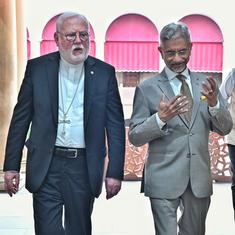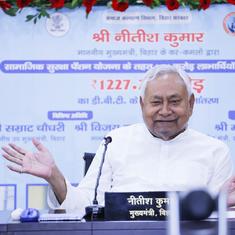God is still Brazilian, or so, three teenage girls, disciples of Jesus, with a placard "free hugs", hummings of "Hallelujah" at the turnstiles, and a [Gabriel] Jesus on the field, had us believe, but Brazilian salvation in a combustive and compelling 120 minutes of box-to-box football came in the form of a brilliant Neymar, Brazil’s delivering prince, in part exorcising the demons of the last World Cup.
"Winning the gold medal is almost an obligation because of the weakness of the opposition," wrote former Brazilian player and leading football columnist Tostao in the run-up to the final. "Will victory be the start of a recuperation, or will it be an illusion, postponing the search for a better way forward?”
That was the defining question around football’s gold medal match, an encounter between iconic teams belonging to different schools of football, who have made the pass a central motor of their game but with a different finality. For Brazil, the pass serves individuality, skills and dribbles – supposedly the essence of Brazilian football – and for Germany, it’s the prelude to a realistic attacking.
The final itself was not a pent-up grudge match for that unforgiving afternoon in Belo Horizonte, when the Germans showcased the best of modern football: plenty of ball possession, swift transitions, quick-fire passing, superb movement and lethal counterattacking. Die Nationalmannschaft had revealed its own superb version of the game. In the space of 90 minutes, Brazilian football had become outdated, outmoded and irrelevant.Glorified Under-23 competition
The Olympic final had a different nature – it was the culmination of a glorified Under-23 competition with a poor standard, a tournament with little global impact, even a nuisance in the Olympic cosmos. A gallimaufry of participants, including Fiji and Iraq, competed to the backdrop of a suffocating 16-day obsession with shooting, archery, wrestling and a swat of other understated sports. In all, the Olympic football tournament is without much streamline and process.
Brazil were utterly amorphous in their opening group games against South Africa and Iraq. Rogerio Micale’s 4-3-3 system was dysfunctional, with a giant no-man’s-land between the midfield and the attack. As a consequence, fluency and constructive passing were amiss from the Brazilian game. They heavily relied on individual flashes from Neymar or Gabriel Barbosa and Jesus, both emerging talents.In the crunch pool game against Denmark, Micale tweaked his tactics, with a bold 4-2-4. Luan, from Brazilian club Gremio, came into the attack, next to Neymar, with Brazil’s two Gabriels often drifting inside. Wallace played as the lone specialist defensive midfielder. Brazil brushed the Scandinavians aside 4-0.
Copernican revolution
The implementation of 4-2-4 was a mild Copernican revolution. At the 1958 Sweden World Cup, Brazil employed the system to great effect, starring the teenage Pele and the indomitable Garrincha. Back in the autumn of 2012, Brazil coach Mano Menezes, benign and with football intelligence, fielded a 4-2-4 formation in friendly matches against Japan and Iraq. Ramires and Paulinho played in front of the defense. Oscar and Kaka, higher up the field, scored as Brazil ran up ten goals in the two games.
For the first time, immemorial, Brazil had attempted to play expansive football again, based on possession and genuine forward intent. In short, everything "O Jogo Bonito" prescribes and claims to be. The Brazilian Football Confederation, the CBF, a bastion of white, conservative and whisky-sodden football autocrats who loath the idea of progress, fired Menezes.
Under Micale, Brazil grew as the tournament progressed, taking the sting out of tricky knockout games against Colombia and Honduras with early goals, winning 2-0 and 5-0 respectively, inching ever closely to a fetishised gold medal. That was progress, in the Ordem & Progresso sense – not just the results, but the manner, a daring expression of Brazilian-ness, rekindling the game of old.
Dreams finally materialise
On Saturday afternoon, at the Maracana, the cathedral of Brazilian football, Brazil’s Olympic dreams finally materialised, but at times, the specters of the Maracanazo, Brazil’s infamous 1950 World Cup defeat, and the Mineirazo, surfaced. Little ghosts wandered around amid excruciating tension and existential agony.
Germany dominated a fascinating 120 minutes, but Neymar opened the scoring with a delightful weighted free-kick. He celebrated with his own version of Bolt’s dreaded To-Di-World move. A yellow and jingoistic sea erupted in the stands, an apocalyptic bedlam, with the shrieking level even higher than that at a One Direction concert.Unfazed, Germany hit the woodwork thrice before Max Meyer deservedly equalised. Toljan ran down the right and the German captain clipped the ball into the corner, an indictment of Brazil’s defensive laxness and a strike of rippling severity. Meyer kissed his shirt with the number seven. Angst and frisson were now palpable. Brazil laboured, even pressed in the dying seconds of extra-time, but the inevitable arrived duly, a penalty shootout, that cruel five-attempts bout of pain.
Neymar converted the fifth penalty and thereafter his kerchief read "100% Jesus". Cue pandemonium and delirium. Neymar and Micale sobbed in each other's arms. Gold, sweat and tears for Brazil – and a minimum measure of redemption.









